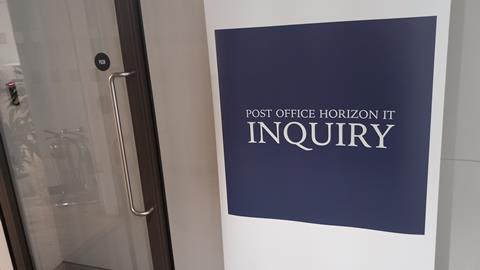Lawyers working for the Post Office have told the statutory inquiry into the Horizon scandal that staff will risk being burnt out if they keep working all hours, it has emerged.
National firm Burges Salmon, the Post Office’s legal representative for the inquiry since September, wrote a few weeks after its appointment about a number of issues around disclosure, including lawyers’ workload.
The firm’s letter, referred to in an evidence session on Friday, said: ‘Although the professionals employed by [the Post Office] and its external advisers are well used to working at pace and for prolonged periods of time, it is not realistic to expect that they will be able to maintain this pace and continue to work during the evenings and over weekends.’
Christopher Jackson, a partner with Burges Salmon, told the inquiry there was a ‘wellbeing aspect’ to how much teams were required to put in.
‘Lawyers work hard. We all work hard and do weekends and late nights, and so on,’ said Jackson. ‘The point that I understand that this paragraph is trying to make is that, if that is relentlessly done over a period of weeks or months, then that has, as it says in the paragraph, a human impact, and has to be factored in.’
Jackson’s written statement noted the ‘very great intensity and pressure’ of the work involved across all inquiry phases.
Disclosure has been a constant issue for the inquiry, with several witness appearances having to be postponed due to relevant documents being provided late. Chair Sir Wyn Williams even warned in July that future requests for evidence would carry a notice with the threat of a criminal sanction and up to 51 weeks’ imprisonment for non-compliance.
Williams said it was ‘grossly unsatisfactory’ that documents were not supplied in good time and noted that many victims of miscarriages of justice saw such errors by the Post Office as deliberate.
In his evidence to the inquiry, Jackson said Burges Salmon and its joint venture partner Fieldfisher began working for the Post Office in May ahead of the handover from Herbert Smith Freehills. HSF has continued to work on a range of disclosure issues connected with the inquiry on phase four, which ends next month.
Since September, 171 HSF staff have worked on the inquiry across all disclosure activities. Of these, 68 were trainees, paralegals or other first-tier reviewers. A further team of 45 from Peters & Peters has also worked on the inquiry. The Burges Salmon/Fieldfisher arrangement has 175 people working on the inquiry, including 80 trainees, paralegals or other reviewers.
But there continue to be issues with identifying key documents in time for them to be used in proceedings. In the days before investigator Stephen Bradshaw appeared to give evidence (his appearance had been put back from November after disclosure failings), 364 ‘new’ documents were produced. The inquiry had been told just before Christmas that the Bradshaw disclosure was complete.
Burges Salmon was not involved in this process, and Jackson agreed the delays were ‘suboptimal’ and ‘frustrating deeply’ for the inquiry and witnesses.
Jackson said the process of disclosure for phases five and six will be ‘ferociously difficult’ and there would be glitches. ‘But the assurance I can give is that we will use every bit of our professional skill, and I know that Post Office is absolutely of this mind also, to reduce that to the absolute minimum that we can.’
This article is now closed for comment.
































32 Readers' comments